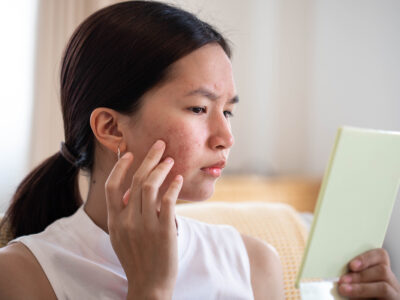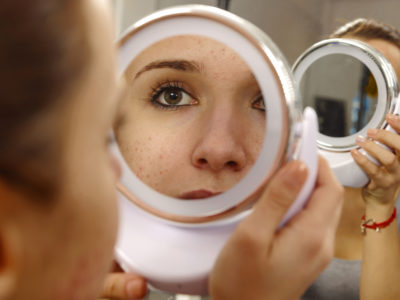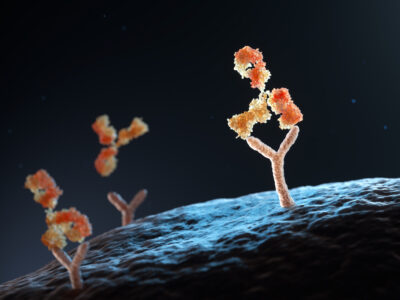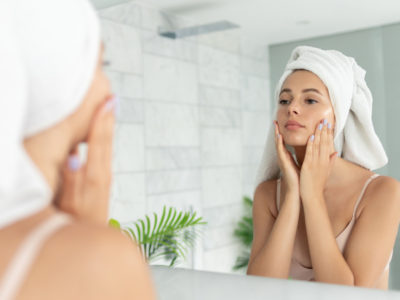Table of Contents[Hide][Show]
5 Easy Ways to Treat Acne+−
- 1. Load Up On Probiotics (Especially Spore-Based Strains)
- 2. Use Effective Skincare Products
- 3. Don’t Over-Cleanse Your Skin
- Back to Basics: Skincare That Matters
- 4. Manage Your Stress
- 5. Talk to Your Doctor About Medication
- Eczema: What It Is and How to Get Relief
- 14 Beneficial And Harmful Chemicals Your Skin Absorbs
- How Do You Know If Probiotics Are Working? 7 Tell-Tale Signs
“I’m breaking out!”
Acne can happen at any time.
While you might think you’re treating it properly with astringent soaps, daily scrubs, and topical ointments, the solution to your acne may lie where you least expect it: your gut.
Let’s explore the world of blemishes and breakouts as we look into the surprising link between gut health and acne.
What Is Acne?
Almost everyone experiences skin blemishes, known as pimples or zits, at some point.
But what’s the difference between pimples, breakouts, and acne?
In the simplest of terms, acne is a disease, and pimples are one of its symptoms. But there’s much more to it than that.
To better understand what’s going on with your skin, let’s take a closer look at each of these terms.
Pimples
A pimple, also known as a blemish or zit, is a small growth on the surface of your skin. They may become inflamed or discolored.
Pimples are incredibly common and can occur at any age, although they are typically linked to hormones. Teenagers, young adults, and women—at specific points during their menstrual cycles—are particularly susceptible to pimples.
When you have a breakout, you’ll see a cluster of pimples in one area, usually your face, arms, chest, or back.
Acne
As we mentioned earlier, acne is a skin disease. It affects the hair follicles and oil glands found on your skin.
If you look closely at your skin, you’ll see that it’s covered by pores, or tiny holes, on its surface. Each of these pores goes down into your skin, where it ends in a follicle that contains one hair and one oil gland.
Your glands release an oil known as sebum—but contrary to what you might think, that’s not what causes your acne. This oil is actually a good thing! It keeps your skin soft and helps remove old skin cells to make room for new ones.
In healthy skin, the sebum produced by your oil glands rises to the surface and spills out over your skin. This is why your skin may look and feel “greasy” after a long day.
Unfortunately, these glands can become clogged by sebum, dead skin cells that aren’t being shed, dirt, or other materials. When that happens, your gland becomes blocked by a comedone, or plug. This may result in a pimple or other type of breakout, one of the key signs of acne.
A blocked gland can have several results, including:
- A whitehead, if the plug is white on top
- A blackhead, if the plug is black on top
- Papules, or small pink bumps on the surface of the skin that may be painful or tender
- Pimples, usually filled with white or yellow pus and often red at the base
If acne goes deeper down into your skin, it can result in hard, painful cysts known as cystic acne.
What Causes Acne?
Acne is the direct result of one of the following:
- Excess oil (sebum) in the follicle
- The buildup of dead skin cells in the follicle
- Bacteria trapped in the follicle
There are also several factors that can trigger acne or worsen existing acne.
Some of the most commonly known acne triggers include:
- Hormones, especially during puberty and menstrual cycles
- Squeezing, scratching, picking, or otherwise disrupting existing pimples
- Pressure on your skin surface from items such as clothing, hats, or backpack straps
- High humidity or excessive sweating
- Cosmetics or hair products that contain oil
- Certain medications, especially those containing hormones
- Excessively rubbing, touching, or resting on your skin
- Diets high in sugar or processed foods
The oil produced by your skin, however, doesn’t usually trigger acne unless it’s an excessive amount—usually due to factors such as high humidity, heat, sweat, etc.
Related
The Link Between Your Gut and Healthy Skin
Good Skin From Within The story is all too common. You have the perfect skincare routine, the best lotions and potions, you keep up to date all the latest tips and trends, but you still have issues with your skin. It’s not your fault, trust us. It’s your gut’s. The skincare industry would love for …
The Link Between Gut Health and Acne
But how does gut health affect acne?
Your gut microbiome is home to the vast majority of the bacteria that live inside your body. It houses colonies of “good” (beneficial) bacteria and “bad” (pathogenic) bacteria.
With limited space available in your gut, these two types of bacteria coexist in a delicate balance. When one flourishes, the other declines.
Ideally, the colonies of beneficial bacteria are healthy and robust, crowding out the colonies of pathogenic bacteria. Unfortunately, the opposite is much more common. This condition, known as dysbiosis, affects not just your gut but the health of your entire body.
Signs of dysbiosis include:
- Anxiety or depression
- Digestive issues
- Fatigue
- Inflammation
- Poor immune response
- Skin conditions, including eczema and acne
This last one may be surprising. After all, how can what’s happening in your gut affect what’s happening on your face, back, or shoulders?
However, research consistently backs up this surprising link, with one study showing that over 54% of acne patients also have an imbalanced gut microbiome.
Let’s take a closer look at some of the ways that acne and gut health are related.
Bacterial Overgrowth
Your digestive system always contains bacteria. But sometimes, it can have too much bacteria. So much, in fact, that it spills over into areas where it doesn’t belong, such as your small intestine.
This condition is small intestine bacterial overgrowth (SIBO) and it usually occurs when illness or other circumstances slow down the elimination of waste.
And the effects of SIBO aren’t confined to your small intestine. SIBO can lead to problems in your entire digestive system, including your gut, where bad bacteria can now thrive and cause dysbiosis and its associated symptoms, including acne.
Leaky Gut
Your digestive system is lined with a barrier designed to allow healthy substances, such as water or nutrients, to pass through and make their way into your bloodstream. In a healthy body, this barrier should also keep toxins and waste confined to your digestive system, so they can be eliminated.
Unfortunately, if your body is dysbiotic, you can develop leaky gut, a condition in which that barrier allows other, harmful materials to pass through, including bad gut bacteria.
The pathogenic bacteria can make their way to your follicle and or skin surface, where they can cause blockages in your pores that lead to acne.
In addition, the toxins that should have been eliminated by your digestive system are now in your bloodstream, looking for a way out. Often, the route they choose is through your skin, leading to pimples, breakouts, and acne.
Immune Response
Over 80% of your immune system is housed in your gut. If your gut health is compromised, so is your immune health.
In addition to the gut microbiome, bacteria can also be found on the surface of your skin. This isn’t surprising, given the amount of environmental toxins we’re exposed to every day. It’s only when these bacteria become trapped in a follicle that they become an acne-causing problem.
Your immune system, if it’s healthy, can play a role in attacking the bacteria. But, if your immune system is weak, it won’t be able to defeat the bad bacteria on your skin.
Strengthening your gut, and thus your immune system, can be an effective way to neutralize the bacteria that cause acne.
Related
What Are Antibodies (and How Do They Power Your Immune System)?
Learn more about antibodies, the different types (immunoglobulins), and how to boost your body’s antibody production for optimal immune health.
5 Easy Ways to Treat Acne
Identifying your acne triggers can help you decide the best way to treat it.
For example, if you have acne on your forehead, it could be due to oil from hair products. Changing to a less oily product or applying it so it doesn’t drip onto your forehead can help.
If you often rest your chin or the side of your face on your hand, you may see pimples developing in those areas. Being more conscious of your posture can help you eliminate those pimples.
But if you want to avoid acne and practice good skin health, there are some things that everyone can do.
1. Load Up On Probiotics (Especially Spore-Based Strains)
As we discussed earlier, the health of your gut microbiome can play a huge role in the condition of your skin. To reduce, eliminate, and avoid acne, you need a thriving, balanced gut. And one of the best ways to achieve that is through probiotics.
Probiotics are similar or identical to the beneficial bacteria already living in your gut microbiome.
When you consume probiotics, either in food or supplements, they join forces with the existing colonies of good bacteria, helping them grow and flourish. In this way, probiotics are extremely effective in overcoming dysbiosis and rebalancing your gut microbiome.
You can find probiotics in certain foods and drinks, especially those that have undergone fermentation, such as kombucha, miso soup, sauerkraut, and probiotic yogurts. However, it’s difficult to know just how much of the probiotics make it to your gut and how effective they will be. This is due to the fact that most probiotics (including those in most leading supplements) cannot survive the trip through the harsh environment of the stomach to reach the intestines.
An easier, more effective solution is to take a probiotic supplement.
We’re big fans of Just Thrive Probiotic. It contains 4 potent strains of beneficial bacteria that support your digestive, immune, and total-body health. And it’s clinically proven to address leaky gut, one of the possible causes of acne.
Plus, because this is a spore-based probiotic, it has a natural armor-like coating, which means that it’s guaranteed to “arrive alive” in your gut microbiome, where it gets straight to work boosting beneficial bacteria, crowding out pathogenic bacteria, and rebalancing your gut microbiome.
2. Use Effective Skincare Products
Wash your face with gentle, non-drying products, especially those made for acne-prone skin. And always remove cosmetics before going to sleep.
Earlier, we used the term “comedones” for the plugs that cause blocked follicles and can result in acne. Look for non-comedogenic skin care products, which have been tested and proven to not block pores.
3. Don’t Over-Cleanse Your Skin
Contrary to popular belief, washing your face more often or with harsher products won’t stop acne.
In fact, the opposite is often true.
If you scrub your skin excessively or use harsh anti-acne products, your skin will lose too much of its natural oils. To counter this, your follicles will go into sebum overproduction in response.
This excess oil can cause acne.
Related
Back to Basics: Skincare That Matters
Simplify your skincare regime the five steps your skin needs to be healthy, including a one secret to get glowing skin…from the inside out!
4. Manage Your Stress
Here’s a fascinating fact about your body: your gut and your brain communicate all day through your vagus nerve, an internal information highway, known as the gut-brain axis. And because of this, the health of one affects the health of the other.
For example, if you’re nervous about a big meeting, you might have an upset stomach. Or, if you’re experiencing digestive issues, they may cause anxiety or even depression.
If you’re feeling stressed out, your mind is sending those signals to your gut. And your gut sends them to your skin, resulting in acne.
So, managing your stress levels could also have the bonus effect of managing your acne.
5. Talk to Your Doctor About Medication
Certain medications are known to cause acne. Among others, these include steroids, oral contraceptives, medications that affect hormones, and some antidepressants.
Surprisingly, antibiotics can also cause acne. Antibiotics are designed to eliminate bacteria. Unfortunately, they don’t just target pathogenic bacteria. Antibiotics can also attack and destroy the good bacteria in your gut microbiome, causing the dysbiosis that may result in acne.
If you’re taking these or other medications, and notice your skin reacting, consult with your doctor about possible alternatives.
Final Thoughts
Acne and pimples might be common, but that doesn’t mean you have to live with them.
Reducing and even eliminating acne is possible.
- Identify and avoid your acne triggers.
- Practice good anti-acne habits.
- Take care of your gut.
Follow these steps, and your skin will be healthy and clear in no time!
You May Also Like…








